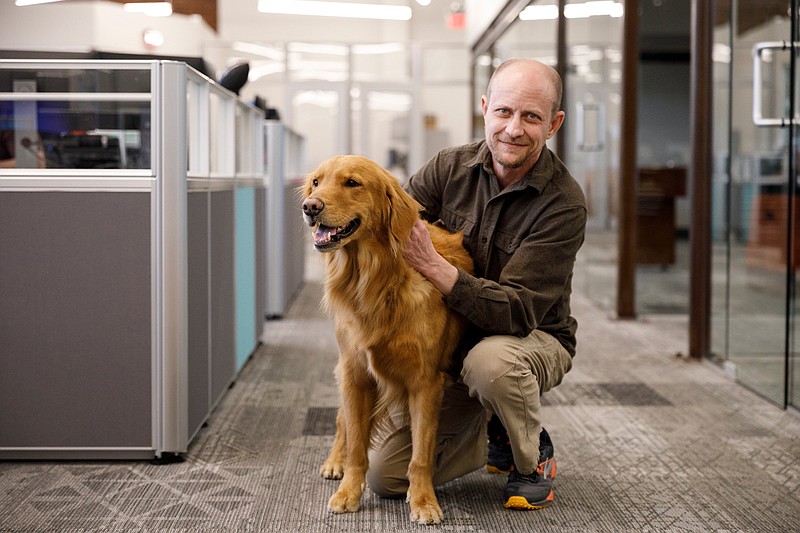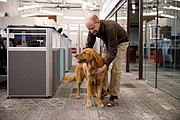Company morale doesn't entirely rest on LeBron Soloff, but sometimes even the chief happiness officer needs a break from work - fresh air, a change of scenery, a place to pee.
OK, it's not that weird. LeBron is a 4-year-old golden retriever who's listed on the Lync Logistics website as one of the key players on the management team for the Chattanooga-based freight brokerage firm. According to his bio, LeBron is responsible for "approximately all of the smiling faces you see around our office" and loves "making humans happy." (And bacon. He loves bacon.)
"Him coming by can change your whole day," says talent manager Hannah Soloff.
She and husband Matthew Soloff, vice president of sales, also get family time with LeBron after hours and weekends. But when LeBron is on the clock, he's a shared asset, a company guy who helps set the tone for Lync Logistics, one of the fastest-growing third-party logistics providers in the country.
The blond-haired, brown-eyed CHO may be the most visible of Lync's creature comforts, but he's not the only way the company is looking to satisfy its workforce. Like many upsurging companies looking to retain talented workers, Lync is open to on-the-job perks that would have been unheard of even a couple of decades ago.
Employers have long supported recreational teams, employee picnics and annual holiday parties. But the workplace in a growing number of local companies today also includes game rooms, fitness facilities and even tap rooms for after-work parties. Working and playing together is seen as key in the team environment of most workplaces today and helps boost productivity.
In Chattanooga, the trend is led by logistics and startup companies, which provide everything from a la carte snack rooms to arcade machines to beer on tap (during designated hours).
Employees might expect to see more of these employee extras, according to MetLife's 17th annual U.S. Employee Benefit Trends Study for 2019. Research reveals that "when employees are supported as individuals, they are more engaged" - meaning that employers "need to think about employees' lives and needs holistically."
"While both employers and employees agree that recognizing the whole person - inside and outside of work - is mutually beneficial, companies underestimate just how important it is in attracting and retaining talent," according to the study's authors.
"One way to do this is to focus more heavily on workplace culture and related programs," the researchers say. "Employers underestimate the value of these intangible factors to employees and, as a result, could be missing opportunities to more deeply engage their workforce."
The major driver of workplace changes over the past 25 years has been technology, which has blurred the line between work and life and given many employees the ability to work anytime, anywhere. To attract and retain talent, employers are seeking innovative ways to keep employees happy, engaged and motivated.
California's Silicon Valley has long had a reputation for extras designed to attract workers to the highly competitive tech industry. Perks that were once considered novel - on-site dry cleaning and haircuts, for example - eventually morphed into media-buzzed play spaces, complete with adult-size ball pits and Big Wheels for hallway races.
"There, it's more the norm than the exception," says Matt Intemann, community manager at Chattanooga's Society of Work, whose co-working spaces are used by entrepreneurs, freelancers and remote workers, among others, who might otherwise be working from home or a Wi-Fi-connected coffee shop.
There are communal spaces for networking and even a game room for break time at Society of Work. About once a month, the refrigerator in the shared kitchen is nicknamed "the kegerator," he says, and loaded with a beer keg for after-hours drinks.
"I think it really does come down to having a comfortable, creative environment that lets people feel relaxed," Intemann says.
Especially in Silicon Valley, he believes, too much emphasis on a company's "fun" culture may be overcompensating or masking bigger issues.
"Some of these companies may be trying to force the culture: 'Look how fun or trendy we are.' A lot of times if the culture is toxic, having a beer at the office or unlimited vacation time doesn't really help. It's a Band-Aid for a deeper problem," he says.
Hannah Soloff credits company owner Cindy Lee with the foresight to overcome Lync Logistics' growing pains. The company was founded in 2014 - "basically three people in a conference room," Soloff says.
In 2018, Lync was named No. 415 on Inc. magazine's list of the 5,000 fastest-growing privately held companies in America, based on the percentage of revenue growth from 2014 to 2017. Lync's was 1,208 percent for that time period.
But success is not without stress.
"It's fast-paced, very high-energy and completely stressful on most days," Soloff says.
A recent remodel has added space for employees to play ping-pong, cornhole and shuffleboard. The new snack room is "basically ... a convenience store where you can buy chips and drinks and sandwiches," she says.
Similar perks are free at Bellhops, a tech-based moving company with about 140 employees at its Chattanooga headquarters and Atlanta satellite office. Last year, the company expanded into 10 new cities and increased its revenue by 150 percent, says Kyle Miller, brand and communications director.
"Company culture is probably the No. 1 priority here," he says. "An awesome company culture translates down the line to the experience of the consumers we serve. ... That's what really drives our company forward.
"Logistics is a pretty tough industry to be in; it's always going," he says, echoing Soloff's experience.
So the company is quick to adapt any change that can simplify the work environment or contribute to worker happiness and productivity, he says.
Maybe that means ping-pong tables or a pellet ice machine or Cinnamon Toast Crunch at the cereal bar. Workers can submit requests for favorite foods for the snack closet.
But it also means making sure the office is "highly functioning from an efficiency standpoint," Miller says. Employees need to have enough spaces designed for productivity, whether it's a conference room large enough to hold a meeting or a quiet space to take a phone call. And it means biweekly "all-hands meetings" where the company's employees are updated on recent successes and how they can play a part in reaching the next goal.
"Every single person, no matter what role you play in the company, gets to be part of the decisions we make," Miller says.
"For us, culture isn't built on bean bags and beer and snacks. It's built on relationships and experiences. The little items are just icing on the cake that make the job more enjoyable."

